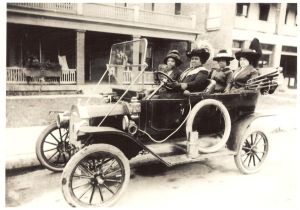“I got my start by giving myself a start”
Madam Walker and Black Entrepreneurs between the Civil War & World War I
While many enterprising African American men and women created profitable outlets for their skills as trades people, artisans and service providers prior to the Civil War, the generation of African Americans born just after Emancipation used their newly found freedom to develop businesses and economic opportunities previously closed to their parents and grandparents.
Among those industrious businesspeople was Sarah Breedlove, a washerwoman born in 1867 on the same Louisiana plantation where her parents had been enslaved and where General Ulysses S. Grant had staged the Siege of Vicksburg. By the time she died in May 1919 at her Irvington, New York estate, she had transformed a humble ointment that healed scalp disease into a million dollar enterprise and become known as Madam C. J. Walker.
Her journey from washerwoman to hair care industry pioneer was facilitated by early mentoring and interaction with members of the National Association of Colored Women and of the Mite Missionary Society of St. Paul African Methodist Episcopal Church in St. Louis. As she developed her business, she benefited from the already established network of Booker T. Washington’s National Negro Business League, attending annual conventions and asserting her claim as “America’s Foremost Colored Businesswoman.”
Within a few years of founding the Madam C. J. Walker Manufacturing Company, she employed thousands of sales agents and “beauty culturists,” and had begun to establish herself as a philanthropist and patron of the arts. As her wealth and influence grew, she expanded her political reach by supporting the NAACP’s anti-lynching campaign, speaking out against discrimination of black soldiers during World War I and advertising heavily in the major African American newspapers.
Her efforts to link enterprise with philanthropy (through contributions to the YMCA and a number of black colleges) and political activism (through her association with activists like W. E. B. DuBois and Ida B. Wells) helped establish precedents for today’s corporate community engagement initiatives.
copyright: A’Lelia Bundles/www.aleliabundles.com
If you quote from this essay, please credit this blog and author.
For more information about Madam C. J. Walker visit our websites at
www,madamwalkerfamilyarchives.wordpress.com
And read
On Her Own Ground: The Life and Times of Madam C. J. Walker by A’Lelia Bundles

